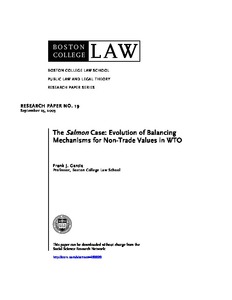The Salmon Case : evolution of balancing mechanisms for non-trade values in WTO
"The Salmon case represents an important step in the evolution of the doctrinal tools available for managing WTO disputes involving non-trade values. Although the Salmon case concerns the specialized WTO Agreement on the Application of Sanitary and Phytosanitary Measures (SPS Agreement), it has...
| Main Author: | |
|---|---|
| Institution: | ETUI-European Trade Union Institute |
| Format: | TEXT |
| Language: | English |
| Published: |
Boston
2003
Boston College Law School |
| Subjects: | |
| Online Access: | https://www.labourline.org/KENTIKA-19180198124919083709-The-Salmon-Case-evolution-of-b.htm |
| _version_ | 1771659897330466817 |
|---|---|
| author | Garcia, Frank J. |
| author_facet | Garcia, Frank J. |
| collection | Library items |
| description | "The Salmon case represents an important step in the evolution of the doctrinal tools available for managing WTO disputes involving non-trade values. Although the Salmon case concerns the specialized WTO Agreement on the Application of Sanitary and Phytosanitary Measures (SPS Agreement), it has implications for the broader development of WTO jurisprudence with respect to the place of non-trade values in the WTO regime.
The SPS Agreement strikes a particular negotiated balance between trade liberalization and the protection of human, animal or plant life or health: trade-restrictive SPS measures will be permitted if they are scientifically justified, non-discriminatory and not more trade-restrictive than necessary in view of the member's chosen level of protection. Disputes concerning SPS measures can be seen as attempts by complaining parties to enforce that balance.
One particular provision in the SPS Agreement, Article 5.6, introduces into SPS jurisprudence the "necessity test," long a part of GATT jurisprudence in, among other provisions, Article XX(b). Overall, the SPS agreement can be understood as an elaboration of Article XX(b) with respect to the specialized subject of SPS measures. However, in contrast to Article XX(b) as interpreted by prior panels, the SPS necessity test as written requires consideration of the effective achievement of a member's non-trade regulatory goals, prior to invalidating the member's chosen measure on trade-restrictive grounds. For this reason, the SPS-version necessity test has the potential to operate in a manner that is friendlier to non-trade values than the standard necessity test.
The Salmon Panel is the first WTO dispute settlement body to rule on an Article 5.6 claim, and its decision and the Appellate Body report afford the first opportunity to examine the extent to which the promise contained in the language of Article 5.6 is indeed borne out in its judicial application. I conclude that the Appellate Body's finding on the limits of a Panel's review of a member's discretion to choose its appropriate level of protection, stakes out a strong position of respect for non-trade values in WTO, albeit in a somewhat problematic manner. Since the necessity test is employed widely throughout GATT jurisprudence, the Salmon case has the potential to influence necessity test interpretation beyond the strict SPS context. I also conclude that the Appellate Body's interpretation of the SPS necessity test in Salmon has increased the likelihood that non-trade values will be respectfully considered outside the SPS Agreement in Article XX cases. When one examines the Appellate Body's interpretation of the traditional necessity test in the Asbestos and Korean Beef cases, one catches a "whiff" of Salmon, confirming that the Salmon case is indeed contributing to the larger task of successfully incorporating respect for non-trade values into the WTO. " |
| format | TEXT |
| id | 19180198124919083709_540d4de6c62446f0921bc1a51253bd3a |
| institution | ETUI-European Trade Union Institute |
| is_hierarchy_id | 19180198124919083709_540d4de6c62446f0921bc1a51253bd3a |
| is_hierarchy_title | The Salmon Case : evolution of balancing mechanisms for non-trade values in WTO |
| language | English |
| physical | 42 p. Digital |
| publishDate | 2003 |
| publisher | Boston Boston College Law School |
| spellingShingle | Garcia, Frank J. dispute settlement environmental protection human rights trade liberalization value system WTO The Salmon Case : evolution of balancing mechanisms for non-trade values in WTO |
| thumbnail | https://www.labourline.org/Image_prev.jpg?Archive=117027993520 |
| title | The Salmon Case : evolution of balancing mechanisms for non-trade values in WTO |
| topic | dispute settlement environmental protection human rights trade liberalization value system WTO |
| url | https://www.labourline.org/KENTIKA-19180198124919083709-The-Salmon-Case-evolution-of-b.htm |

